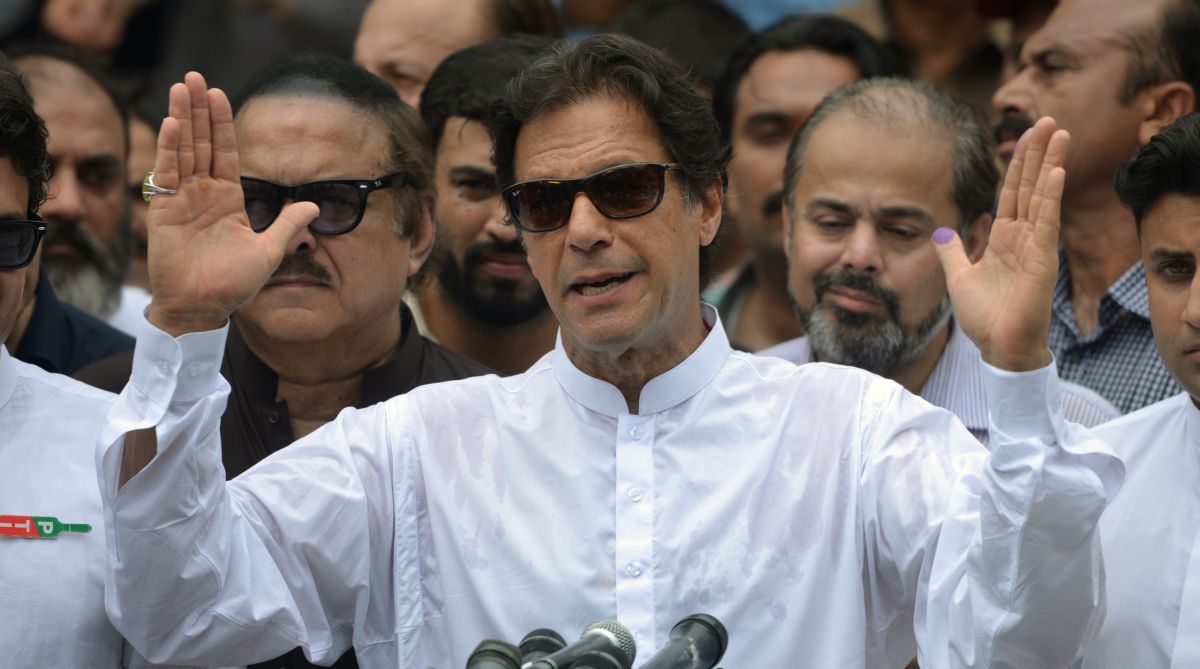Imran Khan’s visit to the Inter Services Intelligence ( ISI) headquarters in Islamabad on September 12 assumes huge significance. It also does not surprise his detractors, who have all along been suspicious about his extraordinary proximity to the armed forces specially towards the ISI. During his visit, he was received by army chief Gen Qamar Javed Bajwa and ISI head, Lt Gen Naveed Mukhtar. Interestingly, Imran was accompanied by his Information Minister Fawad Choudhry and some of his select ministers.
Now, it is the prerogative of a Prime Minister’s to pay an official visit to any of the country’s institutions including the ISI. But there is a definite and noticeable pattern in Prime Minister Khan’s bonhomie with the country’s armed forces within a short time of his formally taking over – on August 18. It is not even a month since he came to the helm.
Advertisement
On August 30, Imran Khan had visited the GHQ and spent considerable time with the key officials getting briefed on sensitive matters including on the prevailing security scenario, threat perceptions in the Pakistani context, and the Army’s ongoing campaign against terror . Also, Imran was thoroughly briefed on Radd ul Fassad – a highprofile, anti-terror operation. Developments related to security with regard to Karachi and Baluchistan also came under intense discussion.
On September 3, Imran met the army chief for a ‘one-on-one’ meeting discussing threadbare the security scene in the country and in the immediate neighbourhood.
On September 6, Imran Khan was conspicuously present as chief guest at the ‘Defence Day’ celebrations which is annually observed in Pakistan to commemorate the “victory” over India in the 1965 war. There were high-voltage speeches and martyrs were remembered. It is in reality an occasion to keep the morale of the forces high and Imran’s presence was possibly an attempt to lend credibility to the occasion as it is ordinarily only a ceremonial event bereft of any substance. The speeches delivered on the occasion by military leaders and Imran gave an erroneous impression that Pakistan had triumphed over India in the ‘65 war reminding the nation of the armed forces’ valour in dealing with its so-called enemies.
On September 12, Imran went to the ISI headquarters and his visit was aggressively publicised including a press release by the ISI public relations. What’s perhaps important is that the briefing to Imran lasted eight long hours and covered all crucial aspects. The Prime Minister of the country spending such a long period in the Intelligence hub of the country means a lot. Let’s assume what was discussed during Imran’s stay at ISI headquarters.
Surely, India and Afghanistan would have been on the agenda as ISI focuses its covert operations on these two countries. Imran praised the ISI for its operational readiness. What’s this operational readiness? By a process of elimination, it would easily mean stepped up actions by the ISI targeting India and Afghanistan. Was it an endorsement of ISI’s plans by the Prime Minister? This is a cogent assumption, given the Imran’s perceived closeness to the ISI before and after the July 25 elections.
For his part, however, Imran tried to dispel the prevailing general “misconception” that it is the military in Pakistan which is calling the shots and that he functions merely as a puppet. Clarifying his stand, Imran said that it is a wrong impression that there is a civil-military imbalance in Pakistan. Describing ISI as efficient and as the world’s finest organisation working as the first line of defence, he lauded its unprecedented achievements. Pakistan experts say Imran wanted to put his stamp on the ISI’s acts and give them political legitimacy.
It is, however, noteworthy that the images of Imran’s face, while interacting and addressing ISI officials, and even his body language suggest that he was tense. If so, this is intriguing. Even if he now tries to distance himself from the armed forces or the ISI in order to establish independent credibility, he possibly cannot easily extricate himself from the sway of the uniform as the first month of his premiership has adequately been appropriated by the army and the ISI. At the same time, he needs to undertake some untiring efforts, albeit gradually, to discreetly script his own agenda.
It would augur well for Imran and his team to focus on a priority basis the perils confronting Pakistan’s economy and terror issues before embarking on optics generated by his series of interactions with the armed forces. Failing this, his concept of ‘Naya Pakistan‘ would continue to go adrift.
The writer is a security analyst, former National Security Advisor in Mauritius and a columnist on security matters. The views expressed are personal.











